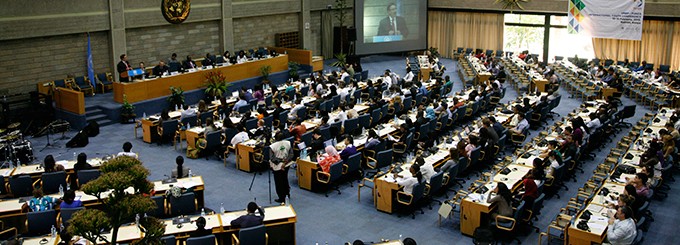Expanding Engagement in International Institutions: The United Nations Environment Assembly (UNEA)
The United Nations Environment Programme (UNEP) was established in 1972 as a UN body to be the first voice for the environment and sustainable development. Since its creation, UNEP has made great strides in promoting stronger global environmental policies on pressing issues from the ozone layer under the Montreal Protocol, to the protection of wildlife under the Convention on International Trade in Endangered Species (CITES), to the international conventions regulating chemicals and pesticides.
In 2013, following the mandate of the Rio+20 UN Conference on Sustainable Development, the 58-member governing body of UNEP adopted a resolution that created the United Nations Environment Assembly of UNEP. The resolution also established universal membership in UNEP, which includes all 193 UN member states, as well as stakeholders and observer states. UNEA is the main governing body of UNEP and the highest political forum on environmental issues, and is assigned the duty to ensure that sustainability is recognized as a global priority and monitor the active participation of relevant stakeholders in the governance on UNEP. UNEA holds inaugural session in June of 2014 which will focus on Sustainable Development Goals (SDGs) and the post-2015 development agenda, as well as illegal trade in wildlife. UNEA will also host a symposium on the environmental rule of law.
CIEL has been working to highlight the importance of civil society and stakeholder engagement in UNEP to encourage a democratic dialogue, accountability, contextual expertise, and global public interest. CIEL Senior Attorney Marcos Orellana currently co-chairs the Major Groups Facilitating Committee (MGFC), which facilitates the participation of major groups in the work of UNEA and organizes the Global Major Groups and Stakeholder Forum (GMGSF). GMGSF strengthens the voice of civil society and can critique the UNEP agenda. Global Major Groups include business and industry, children and youth, indigenous people, local authorities, non-governmental organizations, science and technology, women, farmers, and others (faith-based groups, media, foundations, or multiple sector groups).
UNEA will meet every two years, while its sub-body, the Committee of Permanent Representatives, meets more frequently.
Resources:
Last updated February 2015
